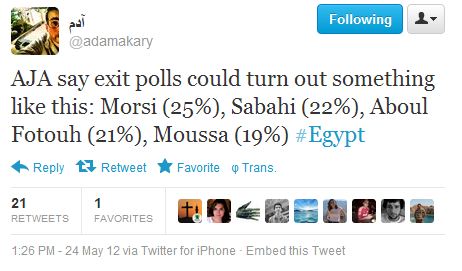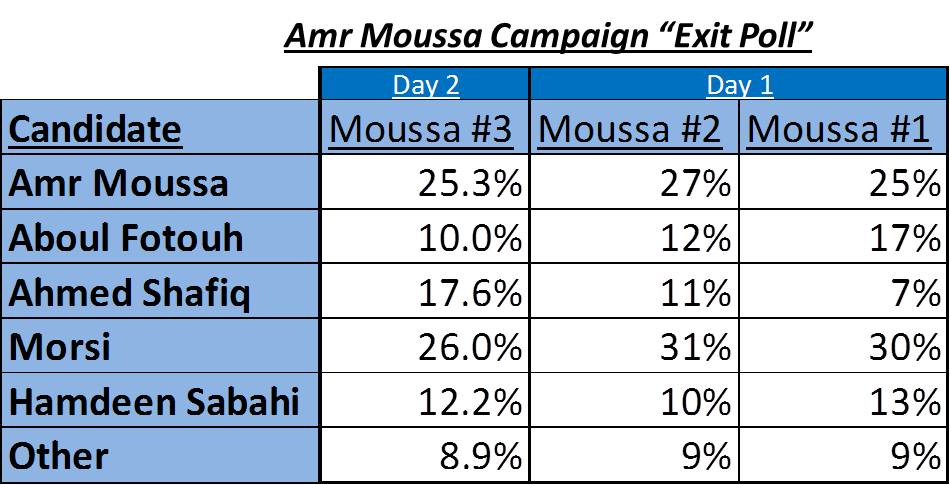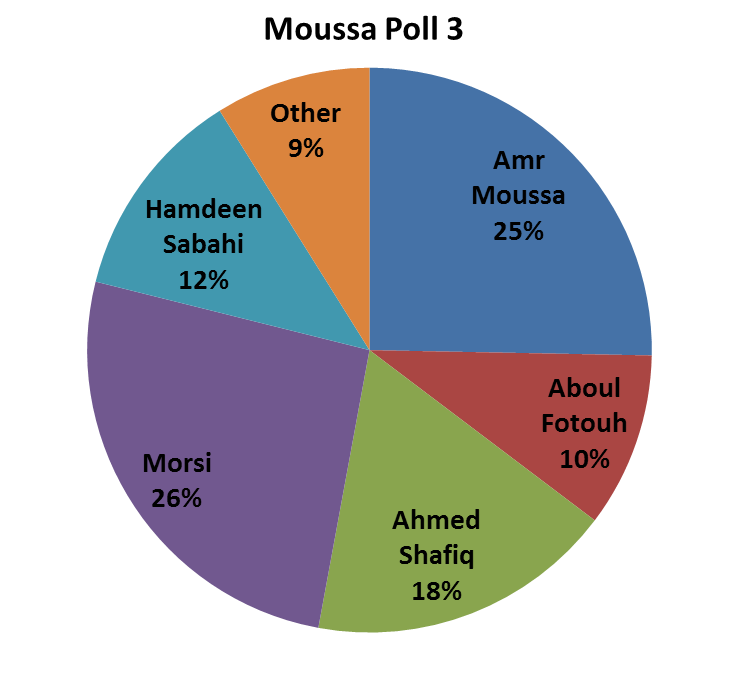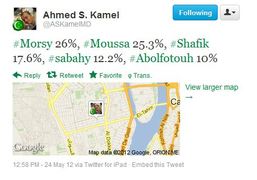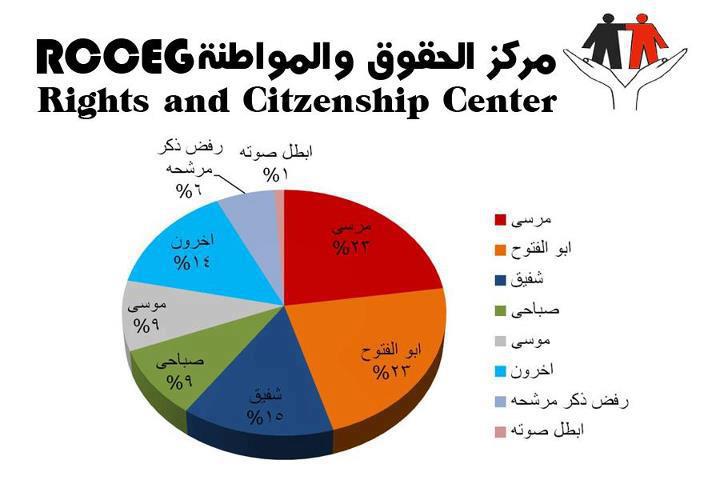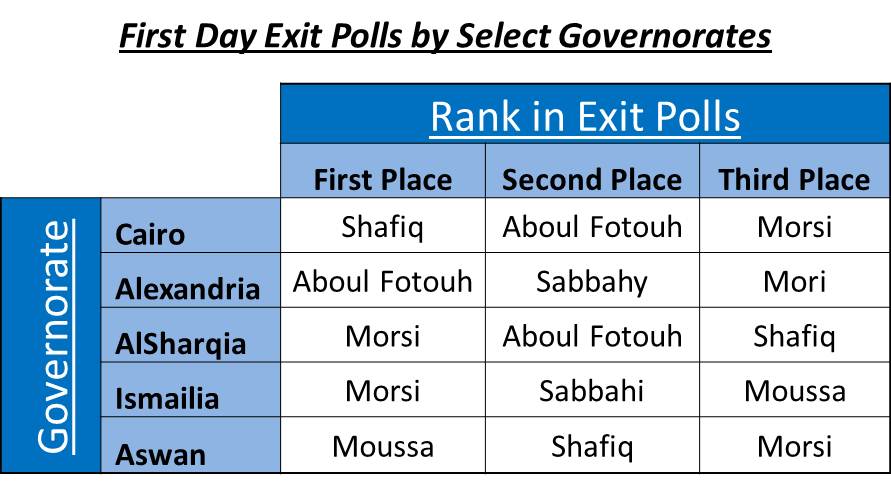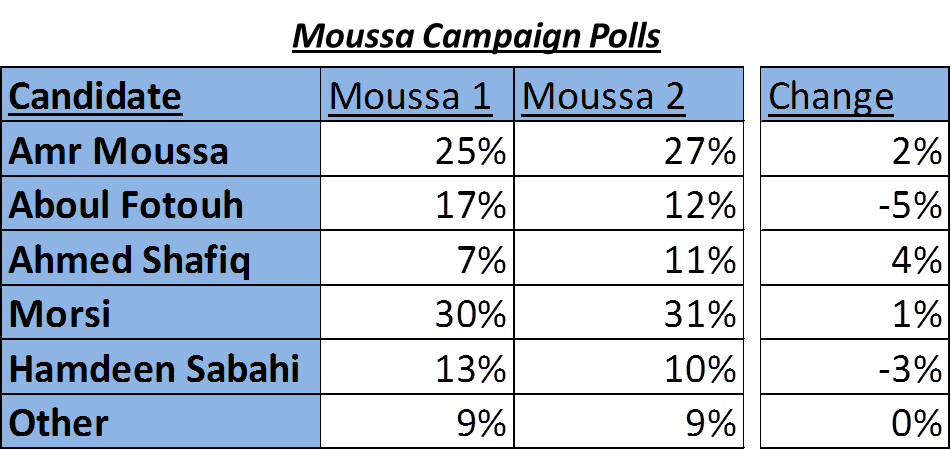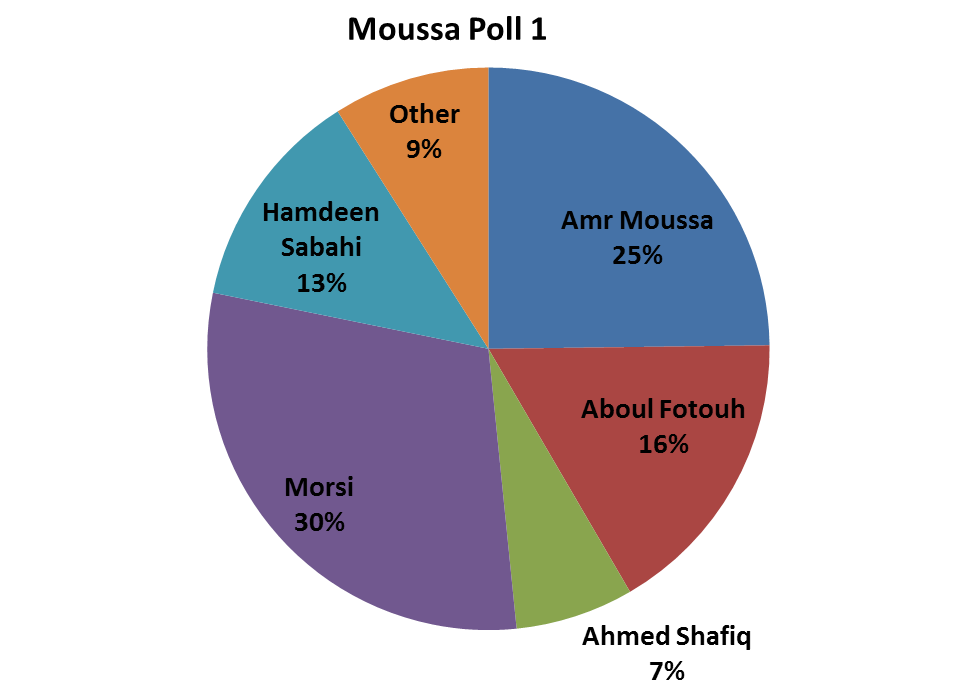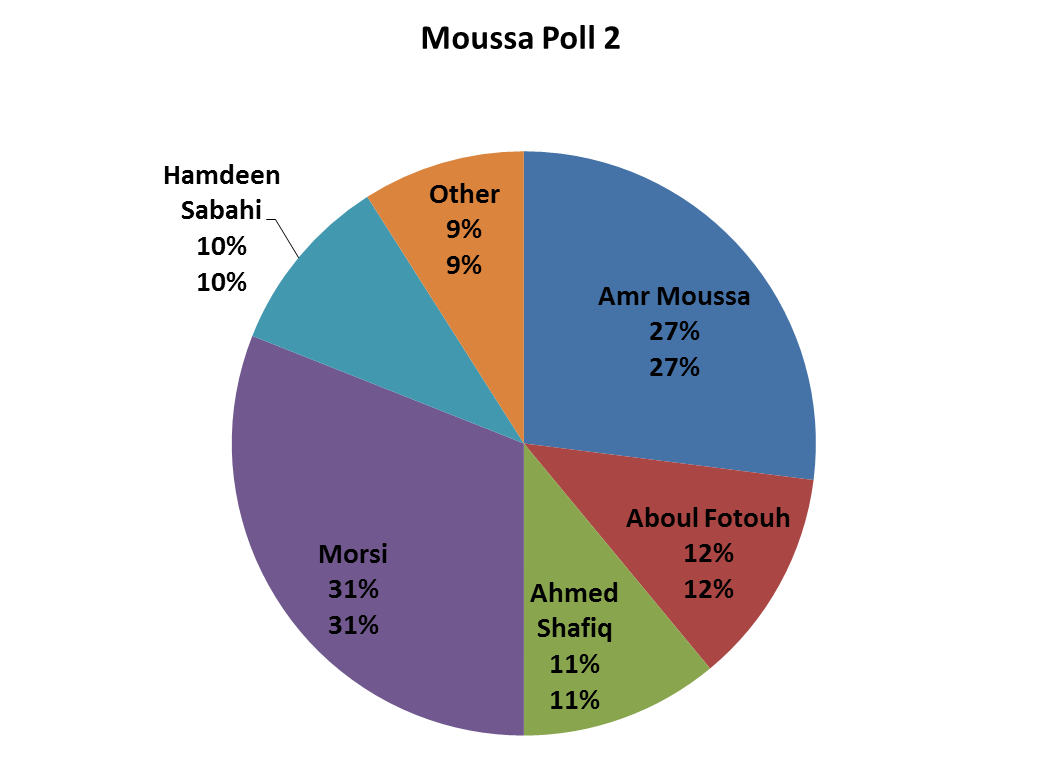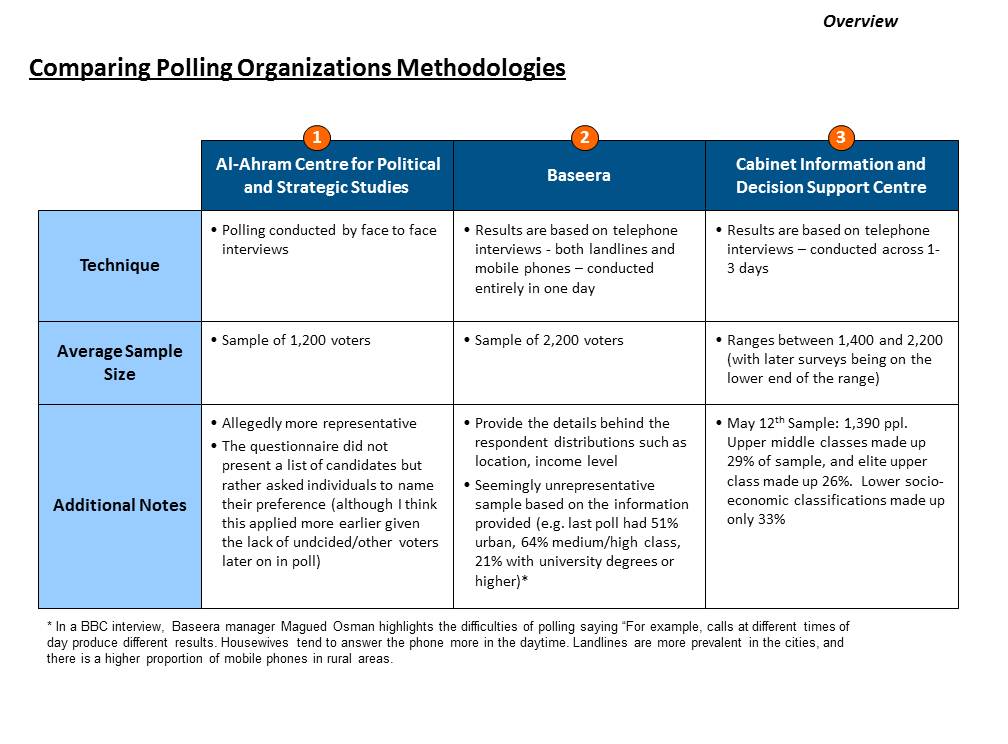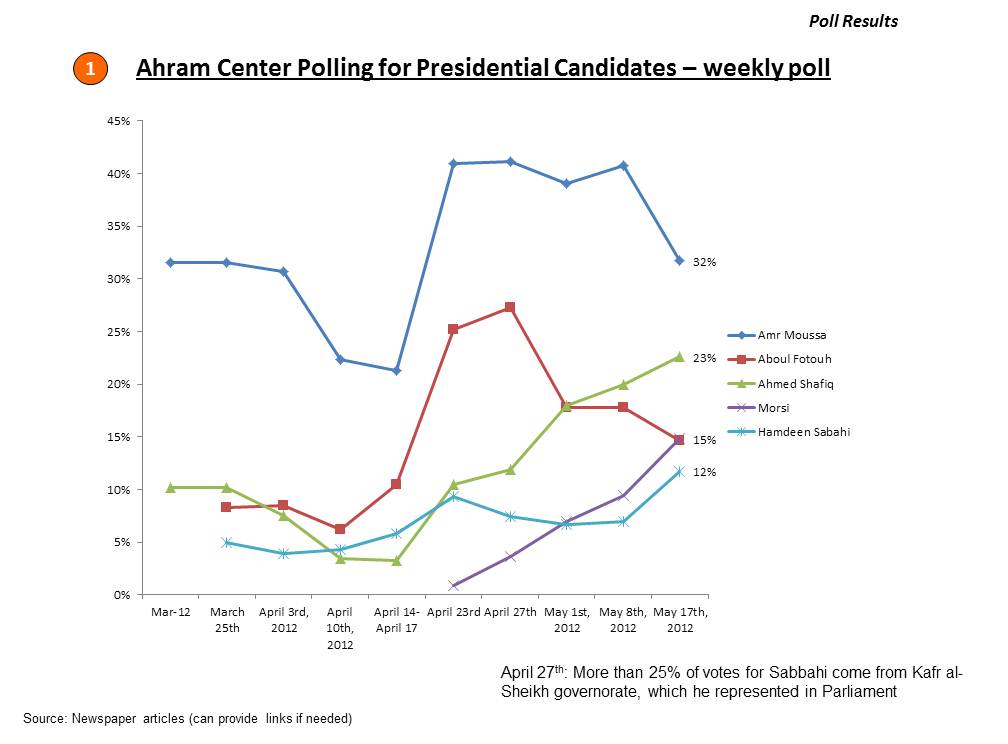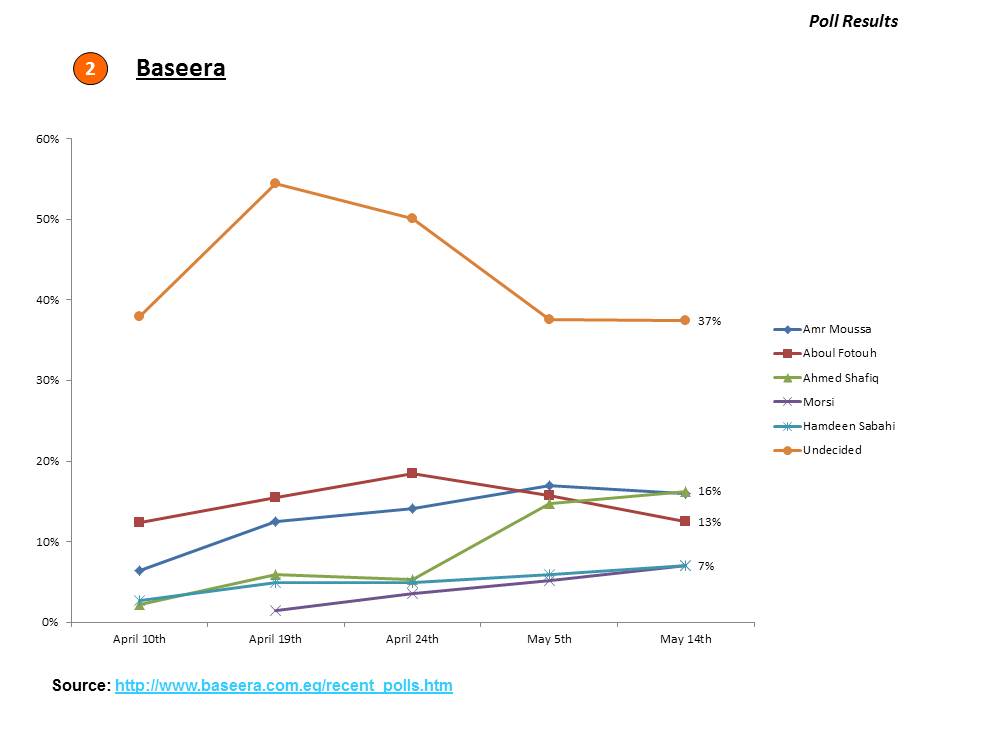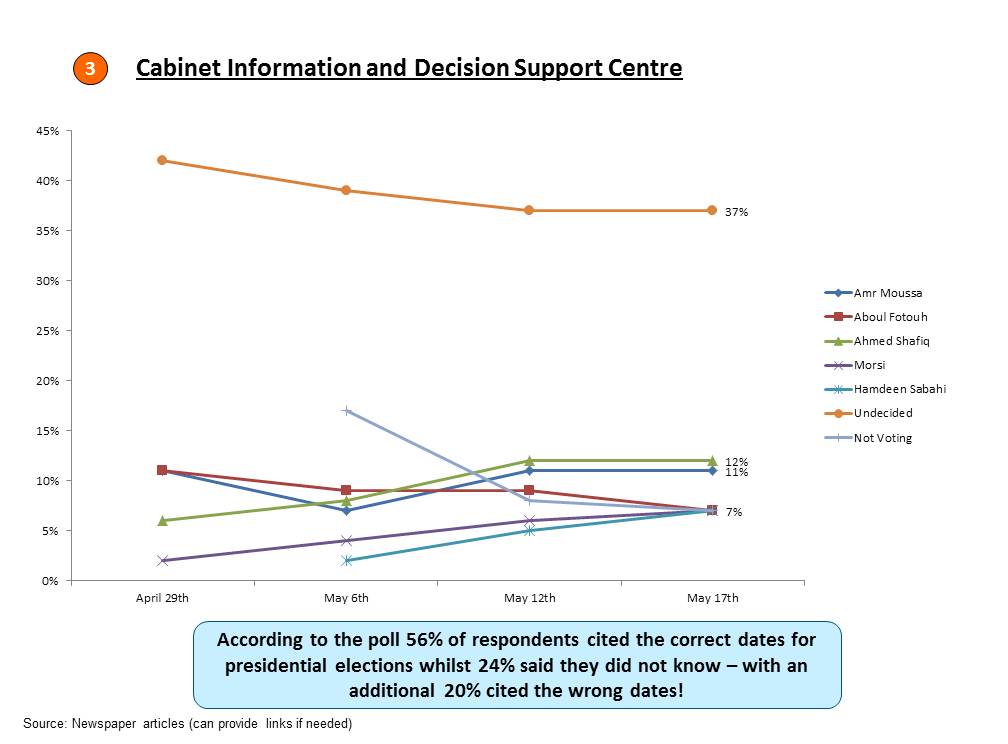UPDATE: Day Two "Exit Poll" Results
I will continue to post as the exit poll results come out then switch to another post to aggregate preliminary voting count results as apparently the FJP/MB organization
1. Moussa Campaign from Twitter: Claims very close race between Morsi and Moussa (obvoiusly within the margin of error, although they don't have details on their figures to confirm that). Moussa campaign is claiming that exit polls "are conducted by representatives in 13,000 polling stations in all governorates."
2. AlJazeera Arabic: Exit polls have a four way very close race (all of them within margin of error I would assume). According to Jamal El Shayyal at AlJazeera the polling included 60,000 people...
Both figures are below... But again, keep in mind the exit polling industry is nascent (was somewhat of a trivial endeavor in Mubarak days) so take these results with skepticism...
I will continue to post as the exit poll results come out then switch to another post to aggregate preliminary voting count results as apparently the FJP/MB organization
1. Moussa Campaign from Twitter: Claims very close race between Morsi and Moussa (obvoiusly within the margin of error, although they don't have details on their figures to confirm that). Moussa campaign is claiming that exit polls "are conducted by representatives in 13,000 polling stations in all governorates."
2. AlJazeera Arabic: Exit polls have a four way very close race (all of them within margin of error I would assume). According to Jamal El Shayyal at AlJazeera the polling included 60,000 people...
Both figures are below... But again, keep in mind the exit polling industry is nascent (was somewhat of a trivial endeavor in Mubarak days) so take these results with skepticism...
So below are comparisons of three different “exit poll” (very loose use of the word!) results that I have come across this morning… See below for tables and details (click on images below the text for larger versions and links are provided to all original sources through highlighted red ink & aggregated pre-elections polls can be found here)
1. Amr Moussa Campaign: Morsi, Moussa, Fotouh, Sabbahy, Shafiq
2. Guy with Hala Sarhan on her show: 3 guys neck and neck, Moussa has no chance
3. @Sandmonkey: Sabahi, Fotouh and Shafiq neck and neck then Morsi then Moussa
4. “Rights & Citizenship Center” : Morsi & Fotouh tie, then Shafik, then Sabbahi & Moussa tie
5. @FJPartyOrg : Corroborates Morsi lead but won't release results til after polls close
So numbers 1, 2, 4 and 5 all have Morsi in the lead or tied for it but other percentages vary.
For Moussa Campaign polls Moussa comes in second place, while the other polls have him faring very poorly. The "Rights and Citizenship Center" has Morsi and Aboul Fotouh tied with Shafik
While I have never heard of them before, The "Rights and Citizenship Center" has some details of who leads in which governorates- will paste below as well. (Also, where they polled specifically)
Hala Sarhan guy (apparently from Al-Ahram center) doesn’t specifically state who is in the lead – just that Moussa is doing poorly, specifically “that Amr Moussa has no chance of winning” and that there are three people who are neck and neck in the race – Shafiq, Sabbahi and Aboul Fotouh.
The above polling seems to corroborate with @Sandmonkey’s – as his article states :” Abol Futouh, Hamdeen & Shafik neck & neck at the top of the race. Then Morsi and fifth comes Amr Moussa.” However, the pollster on the Hala Sarhan show did not explicitly mention that Morsi was doing poorly - just that three were neck and neck, while Moussa is doing poorly - so while not corroborating Sandmonkey's Moussa conclusion, it does not negate it per se.
Obviously the methodologies are not disclosed (guy in video mentions something about 3,000 phone calls but I believe that applies to the pre-election polling they were doing – unclear).
No official results will be announced until next week, and the early releases could be politically motivated (i.e. intended to influence the vote).
Moussa polls disclaimer: The percent of “others” was not stated in the first poll in the stayed the same as the second polling.
Participation rates: http://www.egyptindependent.com/news/live-updates-candidates-cast-their-ballots
Abu Bakr al-Guindi, head of the Central Agency for Public Mobilization and Statistics (CAPMAS), estimated that the projected turnout of the presidential election will be roughly 60%, based on voter behavior on Wednesday.
Guy in Hala Sarhan video claims that participation rates was 12% of registered voters for the first day.
1. Amr Moussa Campaign: Morsi, Moussa, Fotouh, Sabbahy, Shafiq
2. Guy with Hala Sarhan on her show: 3 guys neck and neck, Moussa has no chance
3. @Sandmonkey: Sabahi, Fotouh and Shafiq neck and neck then Morsi then Moussa
4. “Rights & Citizenship Center” : Morsi & Fotouh tie, then Shafik, then Sabbahi & Moussa tie
5. @FJPartyOrg : Corroborates Morsi lead but won't release results til after polls close
So numbers 1, 2, 4 and 5 all have Morsi in the lead or tied for it but other percentages vary.
For Moussa Campaign polls Moussa comes in second place, while the other polls have him faring very poorly. The "Rights and Citizenship Center" has Morsi and Aboul Fotouh tied with Shafik
While I have never heard of them before, The "Rights and Citizenship Center" has some details of who leads in which governorates- will paste below as well. (Also, where they polled specifically)
Hala Sarhan guy (apparently from Al-Ahram center) doesn’t specifically state who is in the lead – just that Moussa is doing poorly, specifically “that Amr Moussa has no chance of winning” and that there are three people who are neck and neck in the race – Shafiq, Sabbahi and Aboul Fotouh.
The above polling seems to corroborate with @Sandmonkey’s – as his article states :” Abol Futouh, Hamdeen & Shafik neck & neck at the top of the race. Then Morsi and fifth comes Amr Moussa.” However, the pollster on the Hala Sarhan show did not explicitly mention that Morsi was doing poorly - just that three were neck and neck, while Moussa is doing poorly - so while not corroborating Sandmonkey's Moussa conclusion, it does not negate it per se.
Obviously the methodologies are not disclosed (guy in video mentions something about 3,000 phone calls but I believe that applies to the pre-election polling they were doing – unclear).
No official results will be announced until next week, and the early releases could be politically motivated (i.e. intended to influence the vote).
Moussa polls disclaimer: The percent of “others” was not stated in the first poll in the stayed the same as the second polling.
Participation rates: http://www.egyptindependent.com/news/live-updates-candidates-cast-their-ballots
Abu Bakr al-Guindi, head of the Central Agency for Public Mobilization and Statistics (CAPMAS), estimated that the projected turnout of the presidential election will be roughly 60%, based on voter behavior on Wednesday.
Guy in Hala Sarhan video claims that participation rates was 12% of registered voters for the first day.
Rights and Citizenship Center Details
النحو التالي :
... محافظة القاهرة :
مدرسة رفاعة الطهطاوي الابتدائية - مدينة نصر .
مدرسة الروضة الإعدادية بنين - مصر القديمة
مدرسة الجبرتي الابتدائية - منشية ناصر
محافظة الاسكندرية :
مدرسة السلام الصناعية - الرمل .
مدرسة الإخلاص الإعدادية بنات - محرم بك.
المعهد الديني الأزهري بكرموز .
مركز شباب سموحة .
محافظة الشرقية :
مدرسة السادات الإعدادية بنات - الزقازيق .
مدرسة جمال عبد الناصر الثانوية بنات - ديرب نجم.
محافظة الإسماعيلية :
مدرسة علي بن أبي طالب - أبو صوير .
مدرسة التل الكبير الابتدائية بنين .
محافظة أسوان :
مدرسة باحثة البادية الابتدائية - أسوان .
مدرسة نجع هلال الابتدائية - نجع هلال.
المدرسة الابتدائية بجزيرة سهيل - ادفو .
وشملت العينة التي أجري عليها الاستطلاع 1311 ناخبا موزعين كالتالي :
محافظة القاهرة 327
محافظة الاسكندرية 414
محافظة الشرقية 275
محافظة الاسماعيلية 158
محافظة أسوان 137
وكانت النتائج العامة كالتالي :
د. محمد مرسي : 22.7%
د. عبد المنعم أبو الفتوح : 22.2%
ف . أحمد شفيق : 14.4%
أ. حمدين صباحي : 9.6%
أ. عمرو موسى : 9.4%
مرشحون آخرون : 14.8%
رفض ذكر مرشحه : 5.6%
أبطل صوته : 1.3%
بينما جاء ترتيب المرشحين في كل محافظة على حدة كالتالي :
محافظة القاهرة :
أحمد شفيق
عبد المنعم أبو الفتوح
محمد مرسي
محافظة الاسكندرية :
عبد المنعم أبو الفتوح
حمدين صباحي
محمد مرسي
محافظة الشرقية :
محمد مرسي
عبد المنعم أبو الفتوح
أحمد شفيق
محافظة الإسماعيلية:
محمد مرسي
حمدين صباحي
عمرو موسى
محافظة أسوان :
عمرو موسى
أحمد شفيق
محمد مرسي
النحو التالي :
... محافظة القاهرة :
مدرسة رفاعة الطهطاوي الابتدائية - مدينة نصر .
مدرسة الروضة الإعدادية بنين - مصر القديمة
مدرسة الجبرتي الابتدائية - منشية ناصر
محافظة الاسكندرية :
مدرسة السلام الصناعية - الرمل .
مدرسة الإخلاص الإعدادية بنات - محرم بك.
المعهد الديني الأزهري بكرموز .
مركز شباب سموحة .
محافظة الشرقية :
مدرسة السادات الإعدادية بنات - الزقازيق .
مدرسة جمال عبد الناصر الثانوية بنات - ديرب نجم.
محافظة الإسماعيلية :
مدرسة علي بن أبي طالب - أبو صوير .
مدرسة التل الكبير الابتدائية بنين .
محافظة أسوان :
مدرسة باحثة البادية الابتدائية - أسوان .
مدرسة نجع هلال الابتدائية - نجع هلال.
المدرسة الابتدائية بجزيرة سهيل - ادفو .
وشملت العينة التي أجري عليها الاستطلاع 1311 ناخبا موزعين كالتالي :
محافظة القاهرة 327
محافظة الاسكندرية 414
محافظة الشرقية 275
محافظة الاسماعيلية 158
محافظة أسوان 137
وكانت النتائج العامة كالتالي :
د. محمد مرسي : 22.7%
د. عبد المنعم أبو الفتوح : 22.2%
ف . أحمد شفيق : 14.4%
أ. حمدين صباحي : 9.6%
أ. عمرو موسى : 9.4%
مرشحون آخرون : 14.8%
رفض ذكر مرشحه : 5.6%
أبطل صوته : 1.3%
بينما جاء ترتيب المرشحين في كل محافظة على حدة كالتالي :
محافظة القاهرة :
أحمد شفيق
عبد المنعم أبو الفتوح
محمد مرسي
محافظة الاسكندرية :
عبد المنعم أبو الفتوح
حمدين صباحي
محمد مرسي
محافظة الشرقية :
محمد مرسي
عبد المنعم أبو الفتوح
أحمد شفيق
محافظة الإسماعيلية:
محمد مرسي
حمدين صباحي
عمرو موسى
محافظة أسوان :
عمرو موسى
أحمد شفيق
محمد مرسي

